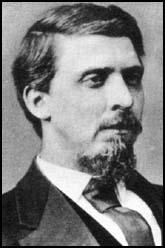Isaac Parker

Isaac Parker was born in Barnesville, Ohio, on 15th October, 1838. He was admitted to the bar in 1859 and worked as a lawyer at St. Joseph, Missouri. For a brief while during the American Civil War Parker served as a corporal in the 61st Missouri Emergency Regiment.
In 1862 Parker became city attorney for St. Joseph. He also served as a congressman (1871-75) before being appointed judge for Western Arkansas. At this stage of his career Parker held progressive political views and was a leading advocate of woman's suffrage and rights for Native Americans.
Parker base was at Fort Smith. It was a region with serious law and order problems and one of Parker's acts was to appoint 200 deputy marshals. He was appalled by the large numbers of these men who were killed by criminals. Parker was determined to get the region under control and ordered the building of gallows that could accommodate twelve men at the same time.
In the next 31 he passed the death sentence on 168 men and four women, of whom, 88, all men, were executed. As a result of these deaths, Parker was given the name the "Hanging Judge". George Maledon, was Parker's Lord High Executioner and executed 60 of the men. He also shot dead five men who tried to escape from Fort Smith jail.
Parker did sometime show sympathy for the criminals who appeared before him. In 1882 Belle Starr was found guilty of horse stealing and only received a sentence of one year in prison. John Overton, found guilty of fraud, was told by Parker: "Go home and sin no more." However, Overton was 98 years old.
In 1889 the Supreme Court judged that people sentenced to death could appeal. Of the 46 people convicted by Parker, who took their cases to Washington, 30 were judged to have been victims of unfair trials. Parker complained that the "appellate courts exist mainly to stab the trial judge in the back". Parker defended himself by arguing "I never hanged a man. The law hanged him. I was only its instrument."
Parker was also ordered by Washington in 1891 to bring an end to public executions. This was followed five years later by the death penalty being abolished.
Isaac Parker died on 17th November, 1896 and is buried in the National Cemetery at Fort Smith.
